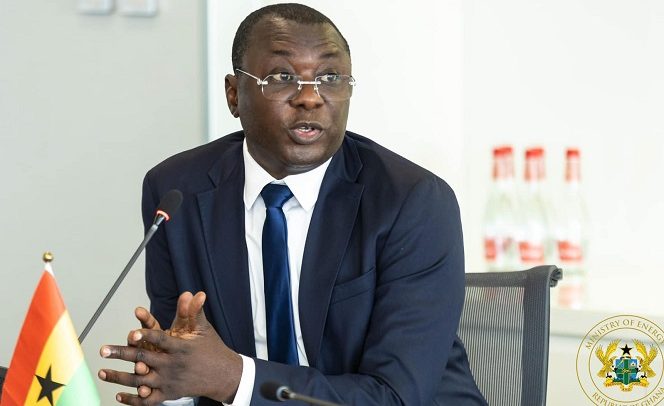Dr. Mohammed Amin Adam
The Finance Minister, Dr. Mohammed Amin Adam, has indicated that the government has no plans of introducing new taxes in its revenue mobilisation efforts.
According to him, instead of overburdening Ghanaians with the payment of more taxes, the government is determined to ensure effective tax collection while minimising tax evasion.
The sector minister made this known after the country reached a staff-level agreement with the International Monetary Fund (IMF) on its Extended Credit Facility (ECF) arrangement over the weekend.
Dr. Adam noted that the suspension of the 15% Value Added Tax (VAT) on electricity consumption and GH¢100 annual levy on owners of petrol and diesel vehicles, had created a GH¢1.8 billion revenue gap.
He indicated that there was an urgent need to increase revenue in line with the implementation of the US$3 billion loan-support programme, but the government was also careful not to burden the few Ghanaian taxpayers.
As such, the government would be resolute in ensuring the effective implementation of revenue generation mechanisms announced, both in the 2023 and 2024 budgets, but lacked effective implementation.
“Now, we’re determined to go out there and collect the taxes from those who have not been paying and those who have been evading taxes, to generate the desired revenue to fill the gap created as a result of the suspension of the taxes,” he said.
Dr. Amin Adam also stated that the government was pursuing reforms within the tax administration to ensure that proper assessments were done, and people were made to pay the appropriate taxes to the state in the easiest and fastest ways possible.
The minister was quick to add that aggressive revenue mobilisation alone would not be an ideal situation for the country, therefore, there would be a focus on expenditure rationalisation as well.
Responding to a question posed to him by the Ghana News Agency on pragmatic expenditure control measures, he stated that the government had been implementing an arrears-clearing plan to address outstanding payments.
Additionally, it was onboarding more agencies to the Government Integrated Financial Management Information System (GIFMIS) to stop state institutions from spending beyond their budget as well as any unapproved expenditure.
Dr. Adam said the government felt the pains that Ghanaians, individuals and businesses alike, had to endure as a result of the implementation of reforms under the ongoing IMF loan-support programme.
While lauding Ghanaians for the sacrifices made since the implementation of the programme in May 2023, he encouraged them to continue to remain patient and sacrificial.
“Some of the reforms that we’re implementing are biting, but I know that we’ll persevere and lead together, and ensure that the benefits of the fiscal consolidation will bring significant relief to the people of Ghana so that we can be counted once again as one of the fastest growing economies in the world,” he said.
Julie Essiam, the Commissioner General of the Ghana Revenue Authority (GRA), provided further details on the alternative revenue mobilisation efforts to fill in the GH¢1.8 billion revenue gap created by the suspension of two tax handles.
She said that the Commission had intensified efforts to ensure the effective implementation of compliance measures on the foreign income of resident Ghanaians in the country.
In doing so, GRA and the Organisation for Economic Cooperation and Development (OECD) have gone through credible and sustainable structures to ensure it generates the GH¢1.8 billion revenue that the electricity and waste pollution tax were to provide.
Governor of the Bank of Ghana (BoG), Ernest Addison, reiterated the government’s determination to make sure that state institutions worked to change the narrative of election expenditure derailing economic progress in the country.
“In Ghana’s recent history, we have not been able to successfully implement an IMF-supported programme in an election year without derailment,” Mr. Addison said.
“The government and the central bank are committed to changing that narrative, and we will remain committed to ensure that programme implementation stays firm,” he added.
Agreement With Bondholders
Dr. Adam has also announced an interim debt relief agreement between the government and bondholders.
He indicated that although a temporal agreement has been reached, it must be aligned to meet the IMF debt sustainability targets.
In a post by his office on social media platform, X, he said, “Update on External Debt Operations: Ghana and Bondholders reached an interim deal, which must still be tweaked to meet IMF debt sustainability targets. We will therefore regroup to continue negotiations until we reach a deal that is consistent with IMF debt sustainability targets.”
The announcement follows the declaration of a staff-level agreement on the second review of the extended credit facility with the country a few days ago.
The agreement moves the country closer to reaching a deal with its external creditors, which will grant access to about US$360 million in financing from the IMF.
However, the staff-level agreement is pending approval from the IMF executive board.
Meanwhile, the Finance Minister, Mohammed Amin Adam is leading a delegation to the 2024 Spring Meetings held in Washington DC, USA.
The team is expected to continue its negotiations with external creditors during the meetings.
By Jamila Akweley Okertchiri


